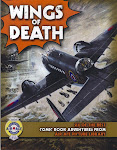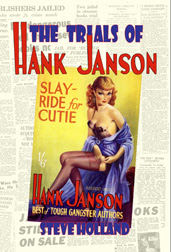Clutha made his debut in Munro's first novel, Who Told Clutha, published in 1958and appeared in seven of Munro's ten novels, the last of which appeared in 1978. Beyond his novels, little seemed to be known about Munro. As well as writing articles, short stories and serials, he also contributed to radio and wrote plays for amateur drama festivals and was at some point editor of Scottish Bagpipe Magazine. Yet his comments in Contemporary Authors hinted at a far broader career:
I have been beating a typewriter ever since my youth, turning out articles and short stories—and also adventure serials for boys' weeklies—but only within the last five years have I attempted novel writing.The phrase "within the last five years" dates the comment to 1963 at the latest, although Clutha's debut had appeared earlier as a serial in the Evening Citizen under the title "The Black Squad Murder". What particularly struck me was that Munro could have been one of the anonymous contributors to the likes of Adventure, Rover, Hotspur and Wizard for D. C. Thomson, as they were among the few regular boys' adventure story papers being published in the 1950s.
Whether that is true or not remains unresolved... but thanks to Ursula Maxwell-Lewis, Munro's niece, I can now offer a little more background than my previous attempt.
Hugh Macfarlane Munro was born at 53 Crossloan Road, Govan, in 1909, the son of George Michael Munro (a riveter) and his wife Margaret (nee Robinson). George Munro's middle name was given in Contemporary Authors as 'Michele' but was pronounced 'Miekle', a remnant of the family's Huguenot ancestry.
Hugh was the third youngest of eleven children and grew up in Glasgow and, from around the age of 6, Saltcoats, Ayrshire, where his parents became the proprietors of the Holly House Temperance Hotel. The urge to write seems to have been strong in the family as four of Hugh's siblings became writers. George, a noted Fleet Street crime reporter and drama critic in the 1920s, was posthumously awarded Writer of the Best New Work for the Stage Produced in Scotland during 1970; Alan, who lived in England, wrote short stories and, using the pen-name Cal Paton, three Western novels published in the 1960s; Sally was a freelance writer in England; and Jean became a freelance writer in Britain, Canada and South Africa.
 | ||
| Hugh's family: George, Sally, mother Margaret and Jimmy ("our own Clutha") Munro |
He was married on 16 September 1939 to Elizabeth Baird and had three children: Sally, Margaret and George. Sally and George both became journalists, for a Glasgow daily (possibly the Daily Herald) and the Manchester Guardian respectively.
Although he wrote short stories for newspapers all his life—he also wrote for Blackwood's Magazine and contributed to the BBC—Hugh was almost fifty before he tackled his first novel. "Nowadays fiction writing leaves little time for anything other than an occasional game of chess," he told Contemporary Authors, where he described himself as a Christian who was suspicious of all politics. Despite a work-related eye injury, he continued to write, although eventually had to resort to using a tape recorder and have a secretary transcribe his work.
He penned three contemporary novels, The Clydesiders (1961), Tribal Town (1964) and The Keelie (1978), which may have given him more satisfaction than the Clutha crime novels. "If ever I write a novel about modern Scottish people good enough to be acceptable by ordinary people throughout the world I'll be content," he wrote. For these he drew strongly on his Scottish upbringing, his last novel, The Keelie, concerning a working-class Glasgow boy struggling with a lack of education and opportunity to gain eventual, although brief, success as a writer.
Hugh's offered the following advice to new writers: "Although only fools despise the tools of Education, if your heart sings and the words come unbidden into your brain you will write tho' all the Devils of Syntax dare you. Believe in yourself and the urge within you. And then—with one eye on contemporary styles and markets—sweat and grind it out according to your own vision."
"He was a truly kind, gentle, patient man with a quick wit and a delightful, dry sense of humour," writes Ursula. "I can't imagine anyone not enjoying his company. We all certainly did. Like all the Munro's, he was hospitable and unstintingly generous with practical advice and encouragement to those of us attempting to break into journalism. He was a dedicated family man, who—even when the typewriter beckoned—was long-suffering when another wall needed painted and papered in their Eglington Street home. Like all the Munros he was an avid letter-writer—which is fortunate since we frequently lived overseas. Those letters were a major link with home."
Hugh Munro continued to live in Saltcoats, Ayrshire, Scotland, where he died in 1982.
 |
| Hugh Munro - champion piper |
Who Told Clutha. London, Macdonald & Co., 1958; New York, Washburn, 1958.
Clutha Plays a Hunch. London, Macdonald & Co., 1959; New York, Washburn, 1959.
A Clue for Clutha. London, Macdonald & Co., 1960.
The Clydesiders. London, Macdonald & Co., 1961.
Tribal Town. London, Macdonald & Co., 1964.
Clutha and the Lady. London, Hale, 1973.
Get Clutha. London, Hale, 1974.
Evil Innocence (Clutha). London, Hale, 1976.
The Brain Robbers (Clutha). London, Hale, 1977.
The Keelie. London, Hale, 1978.
Note: Crime Fiction Bibliography lists Hugh Munro as one of the authors behind the house name Jason, which was used on a series of hardboiled crime novels featuring the character J. C. Jason, but these have no connection with the author of Clutha. Munro set all his novels in Glasgow, bar one which took place in Italy (Get Clutha); Jason was a world traveller whose adventures had titles like High Litre Lolita, Honolulu Slay Ride and Three's a Shroud. They were published in 1958-59 by Webster of Sydney, Australia.
(* My thanks to Ursula Maxwell-Lewis for both her memories and for the photos. Ursula is a journalist, photographer and occasional blogger and is interviewed here. Thanks, too, to Jamie Sturgeon for the book jackets.)



























































I've been researching my Family tree and know that my Great Grandmother Magaret (Maggie) Munro (nee Robinson) of Saltcoats was married to George Munro who was the
ReplyDeletebrother of NEIL MUNRO of ParaHandy Fame and that my own Gran was Hugh Munor's Cousin so there if a direct Family link between Neil Munro (Auth . Para Handy) & Hugh Munro (Auth. Clutha Stoies)
I'm surprised also that you haven't mentioned that Clutha is old Scot word for the Clyde ... historically you'll find references to "The Clutha & The Cartha" in Glasgow history ... these being references to the Clyde & the Cart
Hi Wee Mac,
ReplyDeletestumbled on your comment. Hugh Munro was my uncle, I never knew the Neil Munro connection. My father was Alan Munro writer of the western books my cousin Ursula mentions. (Cal Paton) as he was known. I still have his semi autobiograpical manuscript which was said to be too unbelievable to publish,a story of the great depression and a Scots boy as a semi slave on a farm in Canada,and his later exploits in the USA as 'an illegal'.Of course as his son I believe it.
James Munro.
As Jean Munro's daughter, I'm also intrigued by the Neil Munro information.
ReplyDeleteNeither mom, Uncle Hugh, Uncle George, nor Gran (with whom I lived at one time) mentioned the connection. Certainly the time frame fits with our grandfather's time.
Interestingly,J. M. Barrie and John Buchan were both mentors to Uncle George(also my godfather)who would have been very aware of it.
Jim: Tony has done that research and probably know.
The plot thickens!
~ Ursula
PS.
ReplyDeleteMore Munro data is available at
http://www.doollee.com/PlaywrightsM/munro-george.html
Also, many thanks to Steve Holland for taking the time to develop and maintain this interesting site.
Hugh Munro was my great grandfather. Margaret Munro (now Kennedy) is my grandmother. It is so lovely to read an article like this. We stay in South Africa now.
ReplyDelete- Courtenay Munro Davis
As Hugh Munro's daughter I can endorse what my cousin Ursula writes about my father. Yes, he certainly did write for the boys adventure weeklies as I well remember. My first taste of literature was sitting on the floor as he typed reading his scripts 'hot off the press' and becoming engrossed in the hair raising tales. The Munro's certainly have printers ink in their veins. I believe much was due to the oral tradition - sitting round the fires of numerous relatives and telling stories. I confess that during my schooldays I sent sports copy to our local newspaper and dubbed myself "Bully Off". Later my application to join a well respected Scottish newspaper was turned down with the regret that they could not accommodate a woman as they did not have any female facilities in the office. My happy memories of my days in The Scottish Daily Express under our superb News Editor Jack Cooper remain with me always. Bruce Swaddell our lovely Sports Editor took me on board and I became Scotland's first woman sports reporter. My brother George had a journalistic career also and although she is modest, Ursula, my cousin was and is a fine writer and journalist herself.
ReplyDeleteSally MacFarlane Baird Barton (nee Munro)
Hi Sally,
DeleteThanks for taking the time to leave a comment. I don't suppose you remember any of the stories or papers that your Dad wrote for in his early career? (The bibliographer in me needs to know!)